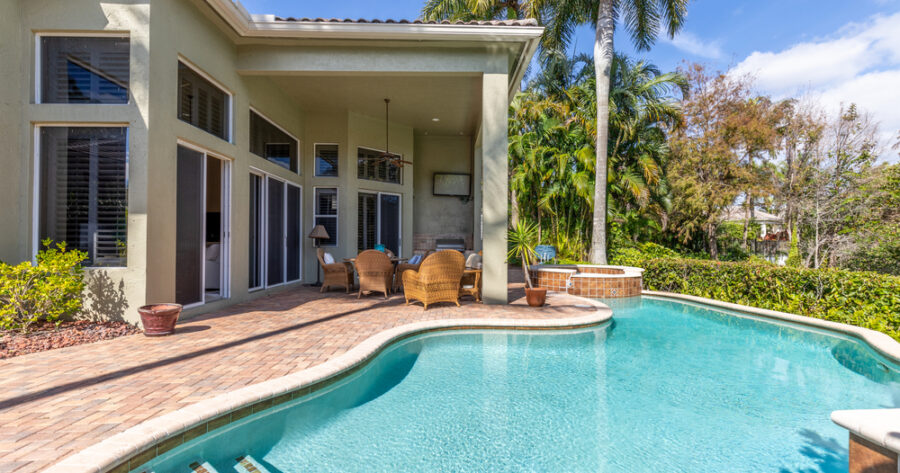An outdoor pool is a great addition to any home, offering a place to relax, exercise, and entertain. However, to keep your pool in pristine condition and ensure it remains safe for swimmers, regular maintenance is essential. This involves a combination of daily, weekly, and seasonal tasks that help maintain water clarity, cleanliness, and chemical balance. Proper upkeep not only enhances the pool’s longevity but also ensures a safe and enjoyable swimming experience for everyone.
Skim and Clean the Pool Surface Daily
Debris such as leaves, insects, and twigs can accumulate on the surface of your pool. Removing this debris regularly helps prevent it from sinking to the bottom and causing further maintenance issues.
- Skim Daily: Use a pool skimmer or net to remove debris from the water’s surface.
- Empty Skimmer Baskets: Check and empty the skimmer baskets daily to ensure optimal filtration.
- Brush the Pool Walls: Brushing the walls and floor of your pool at least once a week prevents algae buildup and keeps the surface clean.
Vacuum the Pool Weekly
Manual or automatic pool vacuums can help remove dirt and sediment that accumulate at the bottom of the pool.
- Manual Vacuuming: Attach the vacuum head to a telescopic pole and hose, then move it slowly across the pool floor to remove dirt.
- Automatic Vacuums: These can be set to run on a schedule, making pool maintenance more convenient.
Maintain Proper Water Chemistry
Balancing the water chemistry in your pool is crucial for keeping the water clean, clear, and safe. The three main components to monitor are:
- pH Levels: The ideal pH range for pool water is between 7.2 and 7.6. Keeping the pH in this range ensures that the water is comfortable for swimmers and helps the chlorine work effectively.
- Chlorine Levels: Chlorine disinfects the water, keeping it free from harmful bacteria and algae. Aim for a chlorine level between 1 and 3 parts per million (ppm).
- Alkalinity: Total alkalinity helps buffer the pH levels and should be kept between 80 and 120 ppm.
Use pool testing kits or strips to check these levels regularly. Adjust them as needed using pH increasers or decreasers, chlorine tablets, and alkalinity balancers.
Shock the Pool
Even with regular maintenance, contaminants can build up in the water over time. Shocking your pool, or super-chlorinating, helps to remove unwanted bacteria and keep the water crystal clear.
- When to Shock: Shock your pool after heavy usage, following a rainstorm, or if you notice cloudy water.
- How to Shock: Follow the manufacturer’s instructions for the appropriate amount of pool shock treatment, and make sure to run the pool pump for at least eight hours afterward.
Keep the Pump and Filter System Running
Your pool’s pump and filter are essential for circulating the water and removing debris and contaminants.
- Run the Pump: Ideally, the pool pump should run for at least 8-12 hours a day to ensure proper water circulation.
- Clean the Filter: Depending on the type of filter (sand, cartridge, or diatomaceous earth), clean it according to the manufacturer’s guidelines. A clogged filter can reduce circulation and lead to poor water quality.
Monitor and Maintain Water Levels
The water level in your pool should be at the midpoint of the skimmer opening. If the water is too low, the pump could run dry and get damaged. If it’s too high, the skimmer won’t work efficiently.
- Add Water: Use a garden hose to add water if levels are low.
- Drain Excess Water: After heavy rainfall, remove excess water using a submersible pump or by setting the filter to “backwash.”
Winterize Your Pool
If you live in a region with cold winters, proper winterization is crucial to protect your pool and its components.
- Balance the Water Chemistry: Ensure the water chemistry is balanced before closing the pool.
- Lower the Water Level: Reduce the water level to below the skimmer to prevent freezing damage.
- Add Winterizing Chemicals: These help prevent algae growth and protect the pool liner.
- Cover the Pool: Use a durable pool cover to keep out debris and protect the pool from harsh winter weather.
Keep Your Pool Clean Year Round
Maintaining an outdoor pool may require effort and regular attention, but the rewards are well worth it. By following these steps, you’ll keep your pool clean, safe, and ready for enjoyment throughout the swimming season. Consistency is key, and investing time in maintenance ensures your pool remains a beautiful and inviting part of your home for years to come.
